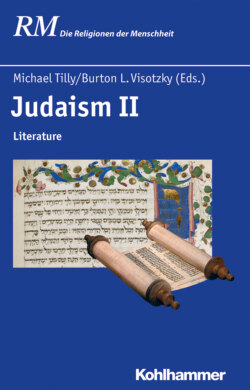Читать книгу Judaism II - Группа авторов - Страница 81
На сайте Литреса книга снята с продажи.
9 Philo of Alexandria
ОглавлениеThe Jewish philosopher Philo of Alexandria (ca. 20 BCE–50 CE) endeavored to combine the narratives and directives of the Torah with ideas from contemporary Stoic and Platonic philosophy, without giving up the biblical-Jewish tradition or image-free monotheism. Despite his thorough knowledge of Hellenistic philosophy, Philo was no outsider, shown through his election as the Alexandrian Jews’ spokesman for important diplomatic affairs.
The works of Philo71 were handed down through Christianity—in Greek, Latin, and Armenian. In Judaism, by contrast, the Jewish philosopher of religion was soon to be forgotten following the demise of Alexandrian Judaism after the Kitos War (115–117 CE). Not a few of his works are lost. The writings of Philo that are preserved are not really consistent in terms of form and content. They can be divided into (1) commentaries on the Pentateuch, (2) philosophical treatises, and (3) historical writings.72
Philo’s systematic interpretations and applications of the law for Alexandrian Judaism view the Torah as composed by Moses under God’s direction (in its Greek version, regarded as inspired). It is not only Israel’s religious guide, but also as a blueprint of creation, as natural law, and as the source of all philosophy. These derive from a shared ancient repertoire of exegetical methods (allegory in particular), by means of which authoritative texts and traditions were afforded contemporary relevance and authority, in an apologetic manner. By linking the biblical material with Jewish beliefs and Greek ideas, they demonstrate their author’s efforts to recognize tradition while also revealing his concern to develop a counter-concept to pagan ideas like Middle Platonism, Stoicism, and neo-Pythagoreanism.
A key theme for Philo was the dialectic between the transcendence and immanence of God. He mediated between Greek and biblical/Jewish thinking by accentuating the absolute difference between the perfect creator and an inadequate creation. He emphasized that the Torah equips and directs the rational human soul to rise from the banishment of the body and the emotions into the world of the divine Logos (the word is found over 1,300 times in Philo).
